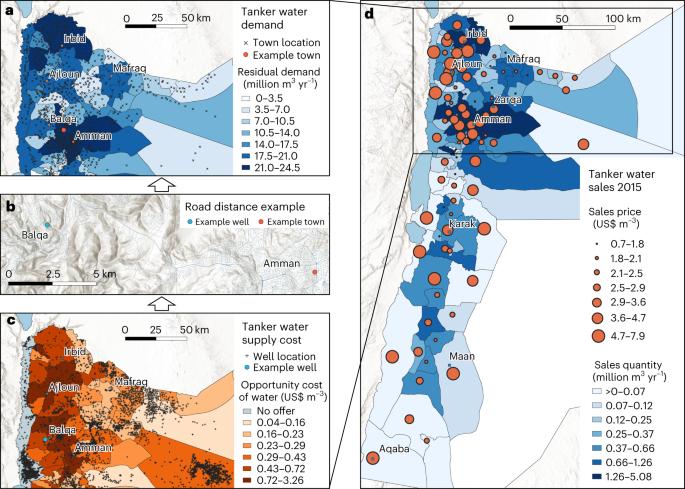Unexpected growth of an illegal water market
IF 25.7
1区 环境科学与生态学
Q1 ENVIRONMENTAL SCIENCES
引用次数: 2
Abstract
Scarce and unreliable urban water supply in many countries has caused municipal users to rely on transfers from rural wells via unregulated markets. Assessments of this pervasive water re-allocation institution and its impacts on aquifers, consumer equity and affordability are lacking. We present a rigorous coupled human–natural system analysis of rural-to-urban tanker water market supply and demand in Jordan, a quintessential example of a nation relying heavily on such markets, fed by predominantly illegal water abstractions. Employing a shadow-economic approach validated using multiple data types, we estimate that unregulated water sales exceed government licences 10.7-fold, equalling 27% of the groundwater abstracted above sustainable yields. These markets supply 15% of all drinking water at high prices, account for 52% of all urban water revenue and constrain the public supply system’s ability to recover costs. We project that household reliance on tanker water will grow 2.6-fold by 2050 under population growth and climate change. Our analysis suggests that improving the efficiency and equity of public water supply is needed to ensure water security while avoiding uncontrolled groundwater depletion by growing tanker markets. As the availability of affordable freshwater in urban settings becomes ever more urgent around the world, this study looks at how an unregulated, informal market meets demands at the expense of groundwater resources.

非法水市场的意外增长
许多国家的城市供水稀缺且不可靠,导致市政用户依赖于通过不受监管的市场从农村水井调水。目前还缺乏对这种普遍存在的水资源再分配机制及其对含水层、消费者公平性和可负担性的影响的评估。我们对约旦从农村到城市的水罐车供水市场供需情况进行了严格的人与自然耦合系统分析,约旦是严重依赖此类市场的典型国家,主要靠非法取水为生。我们采用影子经济方法,利用多种数据类型进行验证,估计不受监管的售水量超出政府许可的 10.7 倍,相当于超过可持续产量的地下水取水量的 27%。这些市场以高价供应了 15% 的饮用水,占城市供水总收入的 52%,并限制了公共供水系统收回成本的能力。我们预测,在人口增长和气候变化的情况下,到 2050 年,家庭对水罐水的依赖将增长 2.6 倍。我们的分析表明,需要提高公共供水的效率和公平性,以确保水安全,同时避免日益增长的水罐车市场对地下水的无节制消耗。随着世界各地城市对负担得起的淡水的需求日益迫切,本研究探讨了不受监管的非正规市场是如何以牺牲地下水资源为代价来满足需求的。
本文章由计算机程序翻译,如有差异,请以英文原文为准。
求助全文
约1分钟内获得全文
求助全文
来源期刊

Nature Sustainability
Energy-Renewable Energy, Sustainability and the Environment
CiteScore
41.90
自引率
1.10%
发文量
159
期刊介绍:
Nature Sustainability aims to facilitate cross-disciplinary dialogues and bring together research fields that contribute to understanding how we organize our lives in a finite world and the impacts of our actions.
Nature Sustainability will not only publish fundamental research but also significant investigations into policies and solutions for ensuring human well-being now and in the future.Its ultimate goal is to address the greatest challenges of our time.
 求助内容:
求助内容: 应助结果提醒方式:
应助结果提醒方式:


